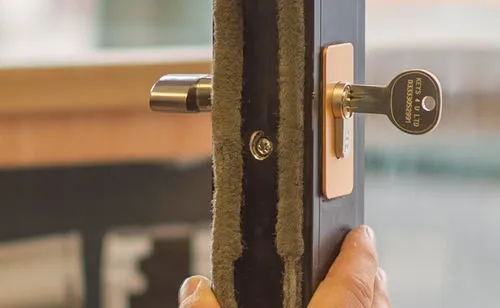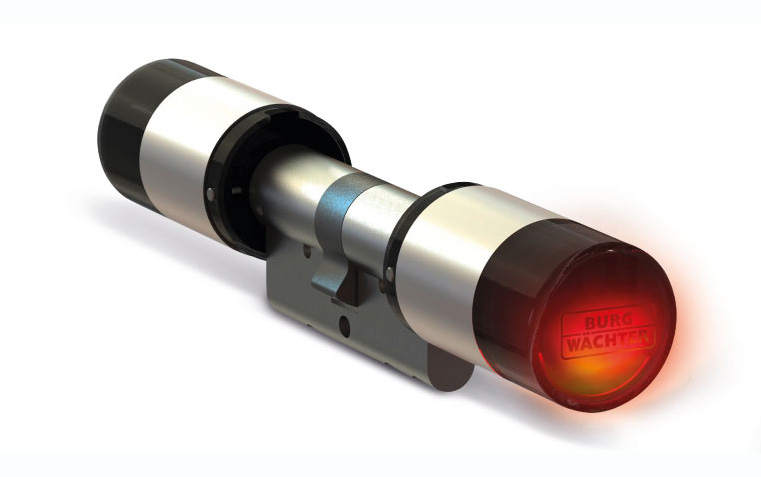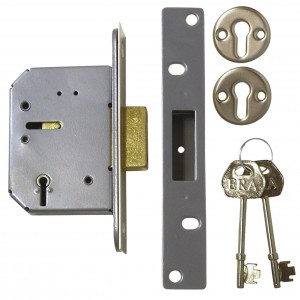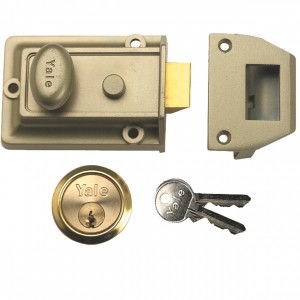
Home security is a top priority for everyone, and choosing the right door lock and handle is crucial for protecting your property and loved ones. With a wide variety of door locks and handle options available, it can be overwhelming to determine the best fit for your needs. This article provides guidance to help you choose the ideal door lock and handle combination, while considering essential factors such as security levels, styles, and functionality. Whether you are seeking to upgrade existing hardware or enhance the security of a new door, you will gain the knowledge you need to make an informed decision.
There are several common types of door locks found in homes. Each type has unique features and levels of security.

These locks use a cylinder mechanism activated by a key. You'll often find them used as a front door lock on exterior doors. Cylinder locks can have various levels of security, determined by factors such as the number of pins in the cylinder. They are known for being relatively easy to install and come in different finishes like polished chrome and satin nickel.

Mortice locks provide enhanced security and are more commonly used in conjunction with other locks, such as a nightlatch. The lock is installed inside a recess cut into the door's edge. Mortice locks can offer higher levels of security compared to cylinder locks but can also be more complex to install.

Typically used as a secondary lock, nightlatches are frequently found on exterior doors in conjunction with a mortice or multipoint lock. They engage automatically when the door is closed and can be opened using a key from the outside or a handle from the inside.
These robust locks offer excellent security and are the preferred choice for external uPVC, composite or timber doors. They use several locking points that secure into the door frame, engaging simultaneously when the key is turned. Multipoint locks are a secure solution, as they are much harder to force open than a lock with a single point of engagement.
When deciding on the appropriate door lock and handle combination for your doors, style plays a role. The right door handles complement your home's interior decor, whilst meeting security requirements and practical functionality. Here is an overview of some of the most popular styles:
Lever handles are the most widely used door handle type. Their ease of operation and straightforward design have contributed to their popularity. They are suitable for both interior and exterior doors and are generally found in conjunction with latches, mortice, cylinder, and multipoint locks.
Door knobs have a more traditional appeal. Although generally not the best option for entry doors due to security concerns, they are popular for use on bedroom doors. They are available with or without locks, usually operated by a button on the inside that needs to be pushed in and turned.
Understanding how to judge a lock's effectiveness will help guide you when choosing your door lock and handle pairing. Pay attention to security standards and look for features that deter forced entry.
The BSI Kitemark is a trusted indicator of quality and performance in security products. Look for locks bearing this marking for added confidence in its ability to protect your home. The Kitemark certifies that products meet the necessary safety standards through thorough testing.
This British Standard specifically applies to door cylinder locks, and a 3-star rating indicates the highest level of resistance to snapping. Euro cylinders with a 3-star rating are becoming increasingly popular as people become more aware of lock snapping. When making a selection for your door lock and handle combination, prioritising security should be at the top of your list.
Depending on the specific location or the style of door in your home, choosing a door lock and handle designed for those situations is vital. Different door materials may require specific types of door furniture, so it is important to make the right choice.
Internal doors can typically accommodate a variety of lock types. Some of the more common locks you will find include latches for privacy, bathroom locks with a bathroom turn, or mortice locks for added security, usually for bedrooms or rooms you wish to keep secured. Door knobs or lever handles work well for these situations.
As exterior doors serve as the first line of defense against intruders, robust security is essential. This often calls for heavier-duty lock options. Mortice locks and deadlocks are frequently chosen to complement a secondary lock. This secondary lock would likely be a nightlatch, cylinder lock, or a multipoint locking system.
Regulations for fire doors may dictate a specific set of requirements. Fire doors should be fitted with certified hardware to ensure they offer sufficient resistance in a fire, including locks and handles that meet these strict safety requirements. It's best to consult with fire door experts before choosing handles or locks for these types of doors.
Selecting the best door lock and handle for your doors relies heavily on the style of your doors, their specific application (interior vs. exterior) and your desired security needs. Budget is always a consideration too, and prices will fluctuate based on brands, material, finish, security level and style. Although it's tempting to purchase the least expensive options available, consider prioritising the quality of the door lock and handle over the cheapest. Compromising on security is something you shouldn't skimp on.
If you are skilled at DIY, you will find some locks are easier to fit yourself. This may mean a cylinder lock or a standard latch is better for you to tackle. For complex locks such as mortice, multipoint locking systems, or anything involving your home's exterior security, it's always best to get help from a professional locksmith. Not only will you benefit from their expertise, but you will also have the peace of mind that they are fitted properly for your security.
Don't be afraid to seek guidance from professionals if needed. Reputable locksmiths or door suppliers like Leader Doors can provide invaluable advice tailored to your unique needs.
Latches for interior doors are fairly straightforward; however they still offer different options. Roller latches offer a quiet closing function, tubular latches are typically used with lever handles, whilst mortice latches offer the highest level of security.
Cylinder locks, mortice locks, nightlatches and multipoint locks are common choices for door security. Cylinder and nightlatches are often used on entry doors; however, multipoint locks provide a superior level of security. Mortice locks often compliment the primary lock on entry doors but can also be used as a stand alone lock.
A deadlock can provide added security, offering an additional point of locking on an exterior door. There are 3 lever and 5 lever versions and mortice deadlocks also offer a variety of backsets.
Door handle and lock mechanisms comprise several components working in tandem. The door handle itself (the lever handle or door knob) interacts with the backplate. This attaches to the door's surface, the latch or lock within the door and the striking plate, fitted to the door frame. It is crucial that these components are selected based on the style, functionality and security features that best meet your needs.
Selecting the correct door lock and handle pairing is a vital aspect of protecting your home and possessions. From exploring diverse lock types like cylinder locks and multipoint locking systems to considering British Standard Institute Kitemarks for reassurance, your decision involves several key factors. Evaluating specific requirements for internal and exterior doors while acknowledging specialised circumstances like fire door regulations further underlines this importance. You are now armed with a wealth of knowledge and understand what goes into making the perfect choices for door lock and handle combinations.
Call Our Emergency Locksmith London team now for a free quote, consultation and advice